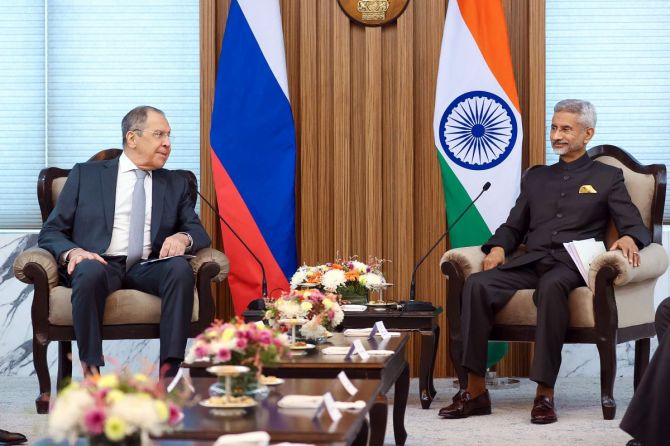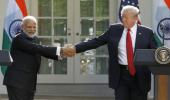The S-400 missile defence deal between India and Russia has a very important meaning for the Indian defence capability and it is being implemented despite the US attempting to "undermine" the cooperation, Russian Foreign Minister Sergey Lavrov said on Monday.

Lavrov said that India "clearly and firmly" explained that it is a sovereign country and makes its own decision on defence procurement.
Talking to media, he said that the situation in Afghanistan figured in his talks with External Affairs Minister S Jaishankar, and asserted that the Taliban must deliver on its commitments of an inclusive government and preventing terrorism and instability from spilling over from that country into its neighbours.
On the S-400 deal, he said it not only has symbolic meaning but has a very important practical meaning for the Indian defence capability.
"The deal is being implemented. We witnessed attempts on the part of the US to undermine this cooperation and make India obey the American orders to follow the American vision of how this region should be developed," he said.
"Our Indian friends clearly and firmly explained that they are a sovereign country and they will decide on whose weapons to buy and who is going to be a partner of India in this and the other areas," he said.
In October 2018, India had signed a USD 5 billion deal with Russia to buy five units of the S-400 air defence missile systems, despite a warning from the Trump administration that going ahead with the contract may invite US sanctions.
The Biden administration has not yet clarified whether it will impose sanctions on India under the provisions of the Countering America's Adversaries Through Sanctions Act (CAATSA) for procuring the S-400 missile systems.
Russian officials said the supply of the missiles has already started.
On Afghanistan, Lavrov said the Taliban must deliver on its commitments.
"We share the view with our colleagues that the Taliban must deliver on their commitments to ensure an inclusive government structure and respect human rights, prevent the drug threat and the terrorist threat remaining in the country and prevent instability from spilling over from Afghanistan into neighbouring countries, primarily into Central Asia," he said.
Lavrov said Russia firmly oppose any attempts by the US and NATO to shift their forces, which have withdrawn from Afghanistan "without delivering on any objectives", to neighbouring countries.
"Central Asian partners have emphasised this would be unacceptable just as the idea of pushing many Afghan refugees and direct these flows to Central Asia," he said.
Referring to AUKUS, comprising the US, the UK and Australia, Lavrov said India has distanced itself from the bloc.
"They are part of the Quad group, which brings together India, Japan, Australia and the US, and India focuses and emphasises its interest in economic infrastructure and transport projects within this framework," Lavrov said.
"I believe that India shows that the military component will focus on the AUKUS format and there are already talks of Japan joining this format, and maybe even South Korea. I have strong doubts that this would do anything to promote stability in this region," he said.
He said Russia has conveyed to India that it will oppose any attempts for Indo-Pacific plans and strategies such as AUKUS and other blocs to dominate ASEAN and other structures that have been created in the region.











 © 2025
© 2025